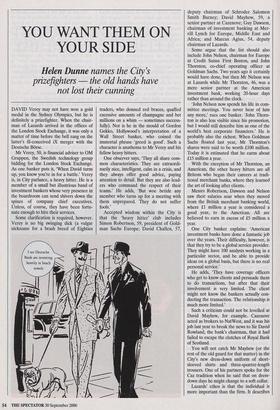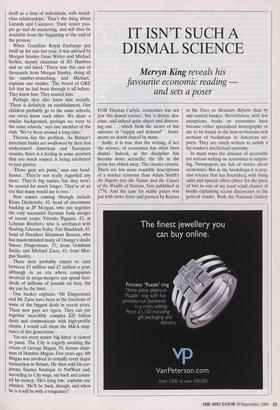YOU WANT THEM ON YOUR SIDE
Helen Dunne names the City's
prizefighters — the old hands have not lost their cunning
DAVID Verey may not have won a gold medal in the Sydney Olympics, but he is definitely a prizefighter. When the chair- man of Lazards arrived in the offices of the London Stock Exchange, it was only a matter of time before the bell rang on the latter's ill-conceived iX merger with the Deutsche Borse.
Mr Verey, 50, is financial adviser to OM Gruppen, the Swedish technology group bidding for the London Stock Exchange. As one banker puts it, 'When David turns up, you know you're in for a battle.' Verey is, in City parlance, a heavy hitter. He is a member of a small but illustrious band of investment bankers whose very presence in the boardroom can send shivers down the spines of company chief executives. Unless, of course, they have been fortu- nate enough to hire their services.
Some clarification is required, however. Verey is no big swinging dick (a vulgar nickname for a brash breed of Eighties traders, who donned red braces, quaffed excessive amounts of champagne and bet millions on a whim — sometimes success- fully). Nor is he in the mould of Gordon Gekko, Hollywood's interpretation of a Wall Street banker, who coined the immortal phrase 'greed is good'. Such a character is anathema to Mr Verey and his fellow heavy hitters.
One observer says, 'They all share com- mon characteristics. They are extraordi- narily nice, intelligent, calm in a crisis, and they always offer good advice, paying attention to detail. But they are also lead- ers who command the respect of their teams.' He adds, 'But woe betide any member who turns up for a meeting with them unprepared. They do not suffer fools.'
Accepted wisdom within the City is that the 'heavy hitter' club includes Simon Robertson, 59, president of Gold- man Sachs Europe; David Challen, 57, deputy chairman of Schroder Salomon Smith Barney; David Mayhew, 59, a senior partner at Cazenove; Guy Dawson, chairman of investment banking at Mer- rill Lynch for Europe, Middle East and Africa; and Marcus Agius, 54, deputy chairman of Lazards.
Some argue that the list should also include John Nelson, chairman for Europe at Credit Suisse First Boston, and John Thornton, co-chief operating officer at Goldman Sachs. Two years ago it certainly would have done, but then Mr Nelson was at Lazards while Mr Thornton, 46, was a mere senior partner at the American investment bank, working 20-hour days rather than around the clock.
`John Nelson now spends his life in com- mittee meetings. You never hear of him any more,' rues one banker. 'John Thorn- ton is also less visible since his promotion, but I would still describe him as one of the world's best corporate financiers.' He is probably also the richest. When Goldman Sachs floated last year, Mr Thomton's shares were said to be worth £100 million. Today it is estimated that he earns about £15 million a year.
With the exception of Mr Thornton, an American, the other heavy hitters are all Britons who began their careers at tradi- tional merchant banks, where they learned the art of looking after clients.
Messrs Robertson, Dawson and Nelson saw their salaries soar when they moved from the British merchant banking world, where £1 million a year is considered a good year, to the American. All are believed to earn in excess of £5 million a year.
One City banker explains: 'American investment banks have done a fantastic job over the years. Their difficulty, however, is that they try to be a global service provider. They might have 100 analysts working in a particular sector, and be able to provide ideas on a global basis, but there is no real personal service.'
He adds, 'They have coverage officers who get to know clients and persuade them to do transactions, but after that their involvement is very limited. The client might not know the bankers actually con- ducting the transaction. The relationship is much more limited.'
Such a criticism could not be levelled at David Mayhew, for example. Cazenove acted as brokers to NatWest, and it was his job last year to break the news to Sir David Rowland, the bank's chairman, that it had failed to escape the clutches of Royal Bank of Scotland.
You will not catch Mr Mayhew (or the rest of the old guard for that matter) in the City's new dress-down uniform of short- sleeved shirts and three-quarter-length trousers. One of his partners spoke for the Caz tradition when he said that on dress- down days he might change to a soft collar.
Lazards' ethos is that the individual is more important than the firm. It describes itself as a firm of individuals, with world- class relationships. 'That's the thing about Lazards and Cazenove. Their senior peo- ple go and do marketing, and will then be available from the beginning to the end of the process.'
When Guardian Royal Exchange put itself up for sale last year, it was advised by Morgan Stanley Dean Witter and Michael Sorkin, deputy chairman of SG Hambro and an old hand. 'There was this cast of thousands from Morgan Stanley, doing all the number-crunching, and Michael,' explains one insider. 'The board of GRE felt that he had been through it all before. They knew him. They trusted him.'
Perhaps they also knew him socially. `There is definitely an establishment. Our children probably go to the same schools, our wives know each other. We share a similar background, perhaps we went to the same schools,' says one member of the club. 'We've been around a long time.'
Therein lies the problem. As Britain's merchant banks are swallowed by their less understated American and European cousins, there is a feeling in some quarters that too much respect is being attributed to past glories.
`Those guys are passé,' says one head- hunter. 'They're not really regarded any more. They're big names, but they won't be around for much longer, They're of an era that many would say is over,' New names coming through include Klaus Diederichs, 43, head of investment banking at JP Morgan, who put together the only successful German bank merger of recent years; Vittorio Pignatti, 42, at Lehman Brothers, who is attributed with floating Telecom Italia; Tim Shacklock, 45, head of Dresdner Kleinwort Benson, who has masterminded many of Orange's deals; Simon Dingermans, 37, from Goldman Sachs; and Michael Zaou, 43, from Mor- gan Stanley.
These men probably expect to earn between £5 million and £7 million a year, although in an era where companies involved in mega-mergers can spend hun- dreds of millions of pounds on fees, the sky can be the limit.
One banker explains: `Mr Dingermans and Mr Zaou have been at the forefront of some of the biggest deals in recent years. These new guys are tigers. They can put together incredibly complex $20 billion deals and communicate with high-profile clients. I would call them the M&A mag- nates of this generation.'
Yet not every senior 'big hitter' is viewed as passé. The City is eagerly awaiting the return of George Magan, 59, former chair- man of Hambro Magan. Five years ago, Mr Magan was involved in virtually every major transaction in Britain. He then sold his cor- porate finance boutique to NatWest and, according to City wags, sat back and count- ed his money. 'He's lying low,' explains one admirer. 'He'll be back, though, and when he is it will be with a vengeance!'



























































































 Previous page
Previous page